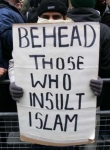22 September 2012
Germany postpones posters aimed at countering radical Islam
 BERLIN (Reuters) - Germany's Interior Ministry has postponed at the last minute a poster campaign advertising a hotline aimed at countering radical Islam because of fears it could have incited violence by extremists.
BERLIN (Reuters) - Germany's Interior Ministry has postponed at the last minute a poster campaign advertising a hotline aimed at countering radical Islam because of fears it could have incited violence by extremists.
Western governments are keen to avoid exacerbating Muslim anger after a film made in California ridiculing the Prophet Mohammad surfaced on the Internet and ignited violent protests around the world, some of them deadly.
The posters had been due to go up in German cities with large immigrant populations from Friday. They were aimed at those who suspected that a friend or family member might be drifting towards radical Islam.
"With everything that is going on right now, we're afraid that it wouldn't take much to trigger more religiously motivated violence," an interior ministry spokesman said.
"We're talking specifically about fanatic individuals who could use events they perceive as being Islamophobic as an opportunity to take action." The spokesman said the ministry had no reason to believe such an attack was imminent.
Protesters angered by the California-made film stormed the German embassy in Sudan on Friday and Berlin withdrew some staff.
Sudan had criticized Germany for allowing a protest last month by far-right activists carrying caricatures of the Prophet Mohammad and also for giving an award to a Danish cartoonist whose depiction of the Prophet in 2005 sparked global protests.
Some Muslim groups had criticized the planned poster campaign because they said it stigmatized them.
The interior ministry still plans to place advertisements online and in magazines with the same design as the posters.
Germany, home to around four million Muslims, has become increasingly concerned about home-grown Islamic militants over the past decade after Hamburg served as a base for three of the September 11 suicide airline hijackers in 2001.
Mistrust among Germany's immigrant population increased after the authorities' botched handling of a wave of neo-Nazi killings of mostly Turkish shopkeepers.
For years, authorities told victims' families that the murders were the result of score-settling between organized criminal gangs.
(Reporting By Chris Cottrell, editing by Gareth Jones and Robert Woodward)
13:33 Posted in EUROPE | Permalink | Comments (0) | ![]() Facebook |
Facebook |



















The comments are closed.